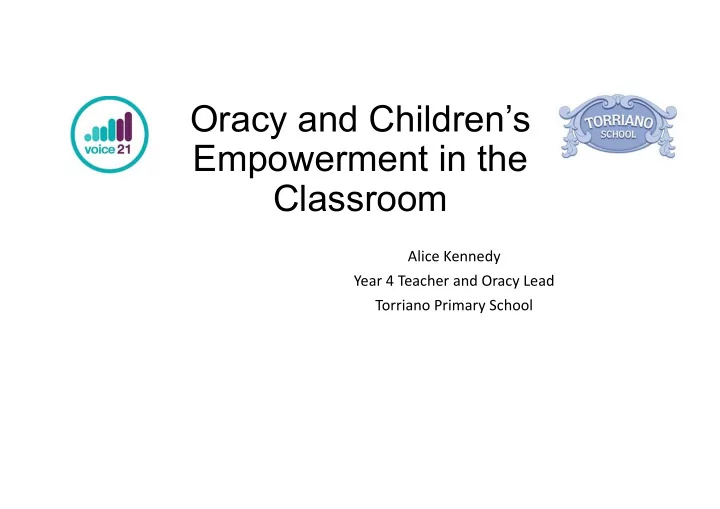

Oracy and Children’s Empowerment in the Classroom Alice Kennedy Year 4 Teacher and Oracy Lead Torriano Primary School
Me – who am I? • Alice Kennedy is Year 4 teacher and oracy lead at Torriano Primary School, Camden, where she has been experimenting with and leading the implementation of oracy rich classroom practice. • She was part of the first national cohort for the Oracy Leaders Programme, run by Oracy Cambridge and Voice 21 set up to build capacity in the state school system to talk through talk. • Previously, she was the English as an Additional Language specialist teacher at Churchfield Primary School, Edmonton, Enfield, where she worked alongside class teachers to develop good teaching for language development. • She has previously worked as a Teacher of English as a Foreign Language and for organisations promoting refugee rights in UK and overseas (in Lebanon and Kyrgzstan).
Today’s aims: - Why and what of ‘oracy’ - Possible links to VIG - Examples of it in practice in school
Why oracy? Neil Mercer Hugh's Hall https://chartered.college/oracy-dialogic-skills-power-spoken- • Attainment of Pupil Premium children • Engagement with society / job market • Empowerment
“Dialogic teaching […] explores the learner’s thought processes. It treats students’ contributions, and especially their answers to teacher’s questions, as stages in an ongoing cognitive quest, rather than terminal points. And it nurtures the student’s engagement, confidence, independence and responsibility.” Prof Robin Alexander (2006)
Tamana Oracy is about Oracy is about being able to stand up in teaching children front of an audience to speak like a and speak with posh person. confidence. Karl What is oracy? Oracy is about being able to articulate what you are learning and using Tom speaking to help you to learn. Oracy is just as much about listening as it is about speaking. Erika
How does oracy link to VIG? • Turn-taking, importance of interaction - watch video https://www.weforum.org/agenda/2018/02/how-you-talk-to-your- child-changes-their-brain/ • Principles of attuned interactions • Being attentive • Encouraging and receiving initiatives • Deepening discussion: coming to joint decisions, naming contradictions
Does it work?
Why I think it’s great • Children get to reason for first time sometimes • Even shy/ disempowered / low attaining children learn their voice matters • Engagement in the class context, children given the scaffolding they need to manage to be in class • Language rich classroom, great for EAL
Recommend
More recommend